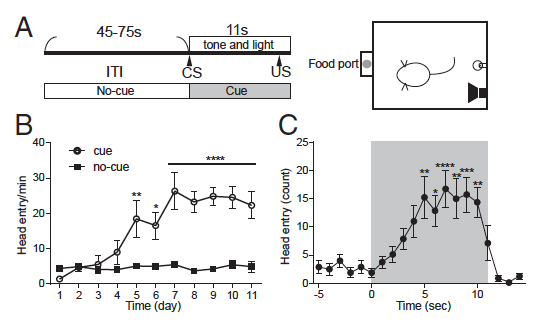Featured Paper of the Month – May 2015
Kusumoto-Yoshida, Ikue; Liu, Haixin; Chen, Billy T; Fontanini, Alfredo; Bonci, Antonello
Central role for the insular cortex in mediating conditioned responses to anticipatory cues. Journal Article
In: Proc Natl Acad Sci U S A, vol. 112, no. 4, pp. 1190–1195, 2015, ISSN: 1091-6490 (Electronic); 0027-8424 (Linking).
@article{Kusumoto-Yoshida2015,
title = {Central role for the insular cortex in mediating conditioned responses to anticipatory cues.},
author = {Ikue Kusumoto-Yoshida and Haixin Liu and Billy T Chen and Alfredo Fontanini and Antonello Bonci},
url = {https://www.ncbi.nlm.nih.gov/pubmed/25583486},
doi = {10.1073/pnas.1416573112},
issn = {1091-6490 (Electronic); 0027-8424 (Linking)},
year = {2015},
date = {2015-01-12},
journal = {Proc Natl Acad Sci U S A},
volume = {112},
number = {4},
pages = {1190--1195},
address = {Intramural Research Program, National Institute on Drug Abuse, Baltimore, MD 21224;},
abstract = {Reward-related circuits are fundamental for initiating feeding on the basis of food-predicting cues, whereas gustatory circuits are believed to be involved in the evaluation of food during consumption. However, accumulating evidence challenges such a rigid separation. The insular cortex (IC), an area largely studied in rodents for its role in taste processing, is involved in representing anticipatory cues. Although IC responses to anticipatory cues are well established, the role of IC cue-related activity in mediating feeding behaviors is poorly understood. Here, we examined the involvement of the IC in the expression of cue-triggered food approach in mice trained with a Pavlovian conditioning paradigm. We observed a significant change in neuronal firing during presentation of the cue. Pharmacological silencing of the IC inhibited food port approach. Such a behavior could be recapitulated by temporally selective inactivation during the cue. These findings represent the first evidence, to our knowledge, that cue-evoked neuronal activity in the mouse IC modulates behavioral output, and demonstrate a causal link between cue responses and feeding behaviors.},
keywords = {},
pubstate = {published},
tppubtype = {article}
}
Reward-related circuits are fundamental for initiating feeding on the basis of food-predicting cues, whereas gustatory circuits are believed to be involved in the evaluation of food during consumption. However, accumulating evidence challenges such a rigid separation. The insular cortex (IC), an area largely studied in rodents for its role in taste processing, is involved in representing anticipatory cues. Although IC responses to anticipatory cues are well established, the role of IC cue-related activity in mediating feeding behaviors is poorly understood. Here, we examined the involvement of the IC in the expression of cue-triggered food approach in mice trained with a Pavlovian conditioning paradigm. We observed a significant change in neuronal firing during presentation of the cue. Pharmacological silencing of the IC inhibited food port approach. Such a behavior could be recapitulated by temporally selective inactivation during the cue. These findings represent the first evidence, to our knowledge, that cue-evoked neuronal activity in the mouse IC modulates behavioral output, and demonstrate a causal link between cue responses and feeding behaviors.

